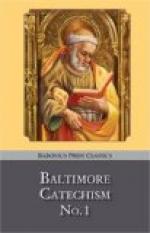271. Q. What is the Sacrament of Extreme Unction? A. Extreme Unction is the Sacrament which, through the anointing and prayer of the priest, gives health and strength to the soul, and sometimes to the body, when we are in danger of death from sickness.
272. Q. When should we receive Extreme Unction? A. We should receive Extreme Unction when we are in danger of death from sickness, or from a wound or accident.
273. Q. Should we wait until we are in extreme danger before we receive Extreme Unction? A. We should not wait until we are in extreme danger before we receive Extreme Unction, but if possible we should receive it whilst we have the use of our senses.
274. Q. Which are the effects of the Sacrament of Extreme Unction? A. The effects of Extreme Unction are: 1st, To comfort us in the pains of sickness and to strengthen us against temptation; 2d, To remit venial sins and to cleanse our soul from the remains of sin; 3d, To restore us to health, when God sees fit.
275. Q. What do you mean by the remains of sin? A. By the remains of sin I mean the inclination to evil and the weakness of the will which are the result of our sins, and which remain after our sins have been forgiven.
276. Q. How should we receive the Sacrament of Extreme Unction? A. We should receive the Sacrament of Extreme Unction in the state of grace, and with lively faith and resignation to the will of God.
277. Q. Who is the minister of the Sacrament of Extreme Unction? A. The priest is the minister of the Sacrament of Extreme Unction.
278. Q. What is the Sacrament of Holy Orders? A. Holy Orders is a Sacrament by which bishops, priests, and other ministers of the Church are ordained and receive the power and grace to perform their sacred duties.
279. Q. What is necessary to receive Holy Orders worthily? A. To receive Holy Orders worthily it is necessary to be in the state of grace, to have the necessary knowledge and a divine call to this sacred office.
280. Q. How should Christians look upon the priests of the Church? A. Christians should look upon the priests of the Church as the messengers of God and the dispensers of His mysteries.
281. Q. Who can confer the Sacrament of Holy Orders? A. Bishops can confer the Sacrament of Holy Orders.
LESSON TWENTY-SIXTH ON MATRIMONY
282. Q. What is the Sacrament of Matrimony? A. The Sacrament of Matrimony is the Sacrament which unites a Christian man and woman in lawful marriage.
283. Q. Can a Christian man and woman be united in lawful marriage in any other way than by the Sacrament of Matrimony? A. A Christian man and woman cannot be united in lawful marriage in any other way than by the Sacrament of Matrimony, because Christ raised marriage to the dignity of a Sacrament.
284. Q. Can the bond of Christian marriage be dissolved by any human power? A. The bond of Christian marriage cannot be dissolved by any human power.




